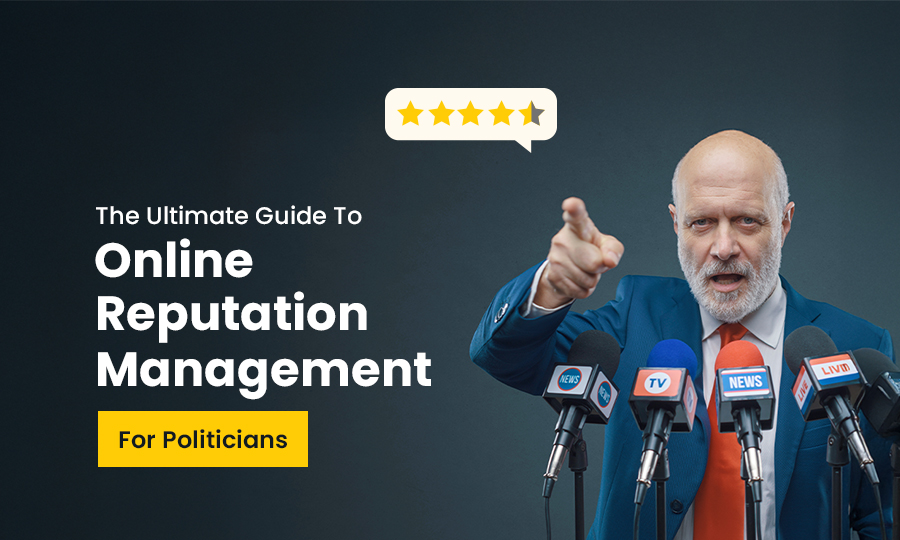Reputation is the most valuable asset for politicians, and the effective management of reputation has always been a challenge for them. Nowadays, every politician must prioritize how their image appears across digital platforms and what the public perceives about them. Effective online reputation management for politicians can help build and protect their public image.
According to a 2024 study by Reuters Institute for the Study of Journalism, 77% of people are more likely to use digital media to access news content. Political news is one of the major types of news content that has continued to gain popularity due to the increased use of digital devices to access news.
Here in this blog, we’ll explore the common reputation challenges a politician can face and how they can overcome them with proven online reputation management (ORM) strategies.
What Is Online Reputation Management For Politicians?
It is the process of monitoring and influencing how a politician is perceived online by the public. It requires you to strategically monitor, influence, or control the digital narrative about a political figure. Online reputation management helps political personalities build their brand image and public trust.
A politician can influence everything from election outcomes to policy decisions with a well-managed online reputation. They can enhance their digital presence and attract more supporters during election times.
On the other hand, it’s quite common for a political person to experience challenges like widely circulating misinformation or negative press. With effective ORM strategies, a politician can overcome these challenges and mitigate their negative impact.
ORM for politicians involves the following proactive measures.
- Social media marketing
- Positive content publishing and circulation
- Online review management
- Negative online content removal
- Public sentiment analysis
- ORM campaign creation
- Crisis communication and management
ORM helps political candidates and leaders build trustworthy relationships with the public and secure a competitive advantage. It ensures that public perception accurately aligns with the desired image.
Common Reputation Challenges Politicians Can Face Online
Political personalities can often encounter reputation challenges that can significantly hamper their online image. It’s more common for political figures as they are associated with many crucial political matters. From the wide circulation of fake news articles about them to social media trolls, a politician can face various challenges. Thus, the need for effective online reputation management for politicians has increased in recent years.
Identifying these challenges and reputation threats beforehand will help you prevent them and take the necessary steps to mitigate their effects as a political person. Check out the 5 most common reputation challenges you can face as a political figure.
- Misleading Headlines/Fake News
It’s quite common for politicians to notice widely circulating false news about them online.
If your voters come across such news, they may lose faith in you. On the other hand, false news can attract intense media attention, which can lead to negative coverage and misleading headlines.
Your opponent’s political party or anyone who wants to damage your political reputation can knowingly circulate misleading headlines or false news about you.
- Viral Misinformation or Deepfakes
Artificial intelligence (AI) can affect a politician’s online reputation and even influence election outcomes if it’s utilized negatively. One of the latest trends is Deepfakes videos – using AI to create realistic yet fake videos.
Imagine a deepfake video of a political leader circulating online just before the election. People can see that the politician is making inflammatory remarks about a sensitive issue. But it’s a fake video that can successfully manipulate, misinform, and mislead the voters.
A politician’s online image can be severely damaged because of such deepfake videos going viral within no time. Politicians are now under constant threat due to these digitally altered videos that can undermine public trust in them. A study by Business Wire has revealed that only 0.01% of people can accurately recognize deepfake videos. Now, can you imagine the emergence of effective detection methods to combat this challenge?
- Unverified Social Media claims
Sometimes information related to political personalities circulates on social media platforms without any proper confirmation from reliable sources. This can be the result of minor inaccuracies, while people can also share unverified claims or crucial information on social media to destroy the reputation of a politician.
These unverified claims can spread and be shared rapidly on social media to gain more views and likes. If these claims involve sensitive topics like public health, safety, or any political events, they can have serious consequences. Many people may believe those claims, and this can lead to extreme misunderstanding.
- Negative Comments from Opponents or Trolls
As a political person, you can receive negative comments from your opponent through social media and other online platforms. People can even troll you for your claims or remarks on specific issues. Try to understand one thing that your opponents will definitely try to damage your online image to gain votes from your supporters.
On the other hand, social media trolls will provoke negative reactions from you through their humiliating actions. Responding negatively to those comments and trolls can fuel their actions and escalate the situation further. Only a strategic approach can save you from such serious consequences.
- Old or controversial Content Resurfacing
For example, you remarked on public safety a few years back. Just before the upcoming election, the video of your old remarks is now resurfacing and causing outrage in public. This old video can be intentionally republished to destroy your public image and manipulate their perception of you.
Your opponents can do this to spark discussion around a specific topic as well. In serious cases, it can lead to the revival of past controversies or highlight outdated information. You can even face legal consequences if the remark has potentially hurt public sentiment.
5 Useful Strategies To Build Politician’s Online Reputation
Building a strong and positive reputation in the digital world plays a major role for political figures. It paves the path for effective online reputation management. Political personalities can hire a reputable online reputation management agency to seek their personalized services to build their digital image. Such companies often provide tailored online reputation management services for political figures and political parties.
However, we’ve highlighted the five most beneficial ways to build a politician’s online image. Follow these strategies to build and maintain a positive political online image.
- Establish a Strong Online Presence
Nothing is more valuable than a strong online presence. Before you build your digital image, you must ensure that you’ve a robust digital presence as well. Wondering how you can establish that? Follow these strategies and make your political presence more visible across online platforms.
- You can create your official website and incorporate updated information and easy navigation.
- You can also actively engage on popular social media platforms like Facebook and Instagram.
- Posting high-quality political content that resonates well with your social media followers can make a major difference in your online presence.
- We also suggest you positively respond to social media comments and messages.
- Engage with More Supporters and Detractors
As a politician, supporters and detractors play a crucial role in your success and career growth. You need to engage with them to build your online reputation. Explore how you can engage with more supporters and critics.
- Always professionally respond to criticism, but after evaluating its nature and source.
- You must address the legitimate criticism with humility and a proper strategic approach.
- Similarly, politicians must engage with their supporters through personalized interactions and swift responses to their queries.
- You should respond to baseless accusations by providing truths and facts.
- Publish Positive User-Generated Content
People love to trust word-of-mouth recommendations. To date, people trust recommendations of their family and friends while making decisions like political voting. User-generated content is one of the best marketing strategies to showcase how many people have trusted you as a politician. Do you know that user-made content gets 28% more responses from people than professional ads? Let’s find out how you can use positive user-generated content to promote a politician.
- You can promote user-generated content through online forums and campaign events.
- You can share videos, reviews, pictures, news stories, and blogs to attract more supporters.
- It’s best to increase this content engagement by reacting to the comments, highlighting the supporters.
- User-generated content allows you to address negative content respectfully and reduce its impact.
- Interpret and React to Online Sentiment
This is another crucial part of building a robust online reputation for political figures. Correct interpretation and appropriate reactions to online sentiment are essential to impactful online reputation management for politicians. Check out the following ways to correctly react to the online sentiment.
- You need to evaluate the source of the online content regarding you and your political persona.
- You can also analyze it contextually and online sentiment through a detailed evaluation.
- You can react to positive sentiment and acknowledge the same. Promoting those can help you effectively handle negative sentiment with proper responses and follow-ups.
- Monitor Your Online Presence Regularly
There are various helpful tools that politicians can use to track their online presence. Regular online reputation monitoring can help them address unfavorable situations. Let’s have a look at how they can monitor their digital presence.
- Tools like Google Alerts and other social listening platforms can help political figures seamlessly monitor their online presence. You’ll get to know about these tools in detail later in this blog.
- With the right utilization of these tools, a politician can track online mentions and sentiments related to their name and political campaigns.
A Step-by-Step Guide To Protecting And Managing A Politician’s Online Reputation
Once you’ve built your positive political image online, your focus must be on protecting it in the long term. Many politicians neglect the protection and safety of their online image, and struggle to overcome the crisis later.
Thus, you must take necessary precautions beforehand and safeguard your online image. It requires you to follow a strategic approach and beneficial steps. Explore the following comprehensive guide to learn how you can effectively protect and manage your online reputation as a politician.
- Be Proactive in Your Approach
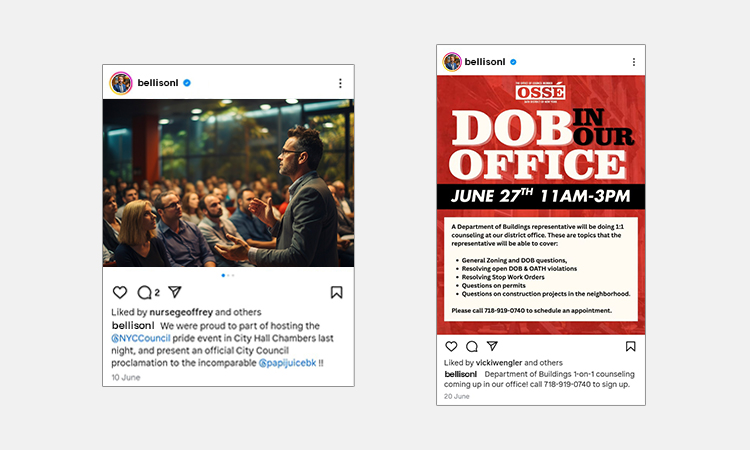
Are you proactive enough to manage your online reputation? If not, it’s time to be proactive in your online reputation management approach.
It’s not that difficult, as you need to regularly monitor your online presence as a political figure by using some tools. And the easiest way to do this is to search your name on any search engine like Google and social media platforms like Facebook. This way, you can track your name mentions on those platforms and analyze for which purpose your name was mentioned.
You can also create positive content that portrays you and your policies in the best possible light. Engaging videos, high-quality images, and informative social media updates are some best examples of such positive content.
How will it help you in monitoring your political image online?
Being proactive in your approach can help you quickly detect negative online information about you. You can remove such information and take necessary steps before it becomes a scandal.
- Track Real-Time Political News

This process offers politicians and their PR teams considerable advantages in numerous ways. In the primary sense, it allows them to monitor breaking news about the political figure and ensure whether they’re well-informed and well-sourced.
For instance, you have noticed that false news has been circulating online recently. If you keep a regular track of the real-time political news, you can easily detect the crisis and take necessary steps to prevent potential damage.
Now the question comes: How can you keep track of real-time political news?
You can employ certain tools and utilize alerts. Another way is to set up alerts for relevant keywords and monitor social media platforms and news sources. Additionally, you must promptly respond to your online mentions and feedback.
Let’s have a look at how you can track real-time political news to ensure the success of online reputation management for politicians.
Set up the Alerts
You can use the following tools to set up alerts for political news or any relevant keywords mentioned in the news.
- Google Alerts – It’s a basic yet effective tool to track your mentions or any political topic related to you across the web.
- Mention/Brandwatch – These two are the most popular social media monitoring tools that can help you track mentions of your name or relevant keywords across various social media platforms.
- News Outlets – You can track your name mentioned across news websites and media outlets. You can understand how a specific story has been reported and ensure the accuracy of information dissemination.
- Custom Alerts – We also suggest you set up alerts for specific keywords, trending hashtags, discussions, or phrases related to your political party or political issue relevant to you.
Monitor and Analyze the Mentions
Explore how you can monitor and analyze the online mentions related to you or your political party.
- You shouldn’t just rely on alerts; rather, you can regularly check monitoring tools to track mentions of your political arena or any relevant topic.
- You must understand the sentiment of those mentions to identify public perception about you in real time – whether their perception is positive, negative, or neutral.
- Identify the key influencers, like which individuals or organizations are talking about you or your political party.
- Monitoring how your opponents are handling similar situations or being mentioned across the web in the same political context.
Appropriately Respond and Engage with the News
Now that you’ve identified the sentiment of those mentions or news related to your political persona, you need to respond to the news correctly. Check how you can appropriately engage with the news or online mentions.
- You must promptly address negative feedback or criticism. You should keep your calm and professionally respond to the negative mentions.
- For the positive news or feedback, you must acknowledge them and thank people for their positive mentions of your name or political party.
- Nothing is more valuable than the circulation of positive content to counter the negative narratives against your political image. You need to create and share positive content to promote your political party’s positive attributes.
- We suggest you participate in meaningful conversations on social media and other digital platforms to shape the public’s opinions about you as a political figure.
- Create Engaging Content to Convey Your Message
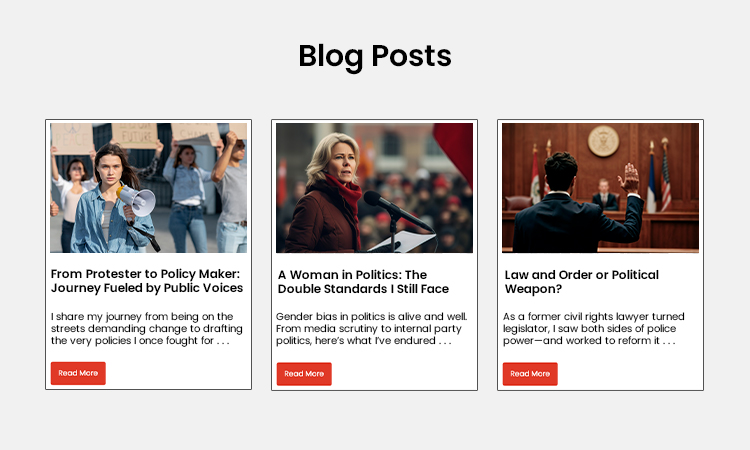
Engaging content can mitigate the potential damage of online controversies and scandals for politicians. Every political figure must create and share positive and high-quality content to promote their party’s message to the public and safeguard their reputation.
The following are some major types of content that a politician must create and share online to convey their message.
- Informative blog posts on various critical political issues and the personal experience of a politician.
- Engaging social media posts and updates on the latest political events and legislative activities.
- News regarding your political candidacy, campaign events, and key endorsements.
- Press releases to prompt journalists to cover positive stories on relevant political topics related to you.
- Videos and podcasts on various topics relevant to your constituents and your political party.
- High-quality images to convey updates and announcements regarding your political party.
- Polls and surveys to gather feedback or public opinion on various political issues.
- Live Q&A sessions to directly engage with voters and answer their queries in real-time.
Other types of content that a politician can craft and share online to showcase a positive image of their political persona.
- Detailed policy proposals to explain specific plans on major public issues like education, healthcare, and the economy.
- Infographics and data visualizations to illustrate complex political issues in an easy-to-understand manner.
- Stories of individuals whose lives have been impacted by your work or by the political issue you’ve handled.
- Opinions regarding current political events and community concerns.
- Leverage Social Media to Connect with Stakeholders

In recent times, social media has become one of the most beneficial tools for online reputation management for politicians. Through social media platforms, politicians can connect with stakeholders, tactfully respond to criticism, and promote their political party’s message.
Key strategies to utilize social media to protect your political reputation are as follows. These strategies can help you build a loyal social media following and address criticism more professionally.
- You must post regular updates about your party on popular social media platforms like Facebook, Instagram, and Twitter.
- You need to engage with your constituents and respond to their comments or messages.
- Politicians must use trending hashtags to join relevant political conversations and trends.
- We suggest you share user-generated content to foster a sense of community.
Did you know that the percentage of negative social media mentions has risen from 2.71% in 2013 to 6.86% in 2017? You can now imagine how social media has become considerably negative over the past few years.
How to Respond to Negative Social Media Mentions?
Now you must be wondering how you can respond to negative social media comments. Let’s find out.
- Responding is essential for negative comments. You can’t just ignore those negative comments or messages, as they escalate the issue further.
- You can engage in public forums and other events to connect with your constituents.
- Transparency plays a huge role here. Politicians must address social media criticisms more transparently and respectfully.
- It’s also essential to foster a sense of community and inclusiveness through your response to negative social media mentions.
Examples of Effective Responses to Negative Social Media Mentions
- If a politician is mentioned on social media for a particular policy, he/she can reply with “I understand the concerns raised about (the policy). I intended to (explain the rationale) and I’m open to hearing feedback on how to improve it.”
- For cases where a politician is criticized for misinterpreting information, he/she can respond, “While I understand the confusion, the statement was based on (the source of the information) and I’m happy to provide further context.”
- If a political figure is mentioned on social media for a social blunder, he/she can respond with “I appreciate your feedback. While I may have misspoke, my commitment to [core value] remains unwavering.”
How to Remove Inappropriate Social Media Posts?
Not only the mentions, but you can also remove inappropriate social media posts that can harm your political reputation. Let’s have a look at the process of negative social media post removal.
- Identify the content: Firstly, you need to locate the social media post or comment that you want to remove.
- Report it: There is a ‘flag’ or ‘report’ option attached to every post or comment. You can find the option by clicking on the three dots in the upper right side of the post. Through these options, you can report those inappropriate negative posts.
- Provide a valid reason: Then, a list of reasons will appear. You need to select the most appropriate reason why you want to report that post.
- Submit the report: Lastly, you can follow the specific social media platform’s instructions to submit the report.
The above procedure contains the basic practices you can do when you come across a negative social media post about your political party. The other procedures are as follows.
- You can directly contact the person who has shared that social media post.
- This way, you can personally request that person to remove the post.
- Additionally, you can politely ask them to correct the information mentioned in the post.
- It’s recommended to provide valid reasons why you find that specific post inappropriate or harmful to your political reputation.
- As many social media platforms allow you to filter or block content, mute users, and limit the visibility of sensitive content.
- You can also filter out or block certain words, phrases, and even types of content.
Related: Social Media Reputation Management: A Guide to Strengthening Your Social Presence
- Create Online Reputation Protection Campaign

During elections, it becomes more crucial for politicians to maintain their public trust. An effective campaign to protect their online reputation plays a pivotal role. Through a campaign, a political figure can monitor public sentiment trends and respond promptly to shifts in public sentiment.
How to Create a Successful Online Reputation Protection Campaign for Politicians?
Explore how you can create a successful online reputation protection campaign.
Prepare a Digital Campaign Strategy
Firstly, a politician needs to develop a strategy for their digital online reputation protection campaign. To achieve this impactfully, follow the following practices.
- You need to create a content calendar and develop a proactive engagement plan to act mindfully during crucial times.
- You must hire a rapid response team to ensure a steady stream of positive content.
- The team must be capable of addressing the negative press and working on any trending political topic.
Monitor Public Opinion Trends
Now it’s time to monitor the recent trends in public opinion related to political issues.
- You can conduct social media polls and utilize social listening tools essential to online reputation management for politicians.
- You can use these tools to analyze public sentiment and their opinions.
- You need to identify potential issues and make necessary changes to your campaign strategies accordingly.
Influence Public Opinions Promptly
If the public perceives a negative image of you as a politician, it’s your responsibility to rebuild your online image as a credible political resource. Let’s find out how you can do it.
- Charge negative narratives with targeted ads and initiate positive conversations on social media platforms.
- Furthermore, you need to positively influence the shift in public opinion.
- You must highlight the strengths and address the concerns effectively to take precautions beforehand.
Implement Digital Grassroots Strategies
This is one of the most beneficial ways to create an online reputation protection campaign. For example, a political leader has started facing social media trolls and he/she unknowingly participated in a controversy related to a crucial political topic. How can the politician tactfully deal with such situations? The answer is through effective digital grassroots support and strategies.
- You must utilize social media to ensure regular engagement and two-way communication with the followers.
- Through social media, you can share user-generated content to foster public trust and confidence in your political ability.
- There are various digital voter engagement and fundraising tools that a politician can use to leverage email campaigns.
Prioritize Digital PR and News Campaigns
A politician’s digital image partially depends on public relations. The better PR activities they perform, the more effectively they can protect their digital image. Here is how you can leverage digital PR.
- Establish strong relationships with renowned bloggers, especially them whose write-ups perfectly align with your political stance.
- You can write guest posts or send press releases to engage with more blog audiences. This can significantly increase a political person’s online visibility and gain public support.
- You can also write newsworthy content that resonates well with the journalists and your constituents.
Fact-check Your Content
Once you’ve completed the above-mentioned procedure, it’s now time to fact-check the content. You must fact-check the content you’ve created to deal with crucial situations and promptly address any misinformation available online.
- Track Negative Information, Reviews, and Fake Stories
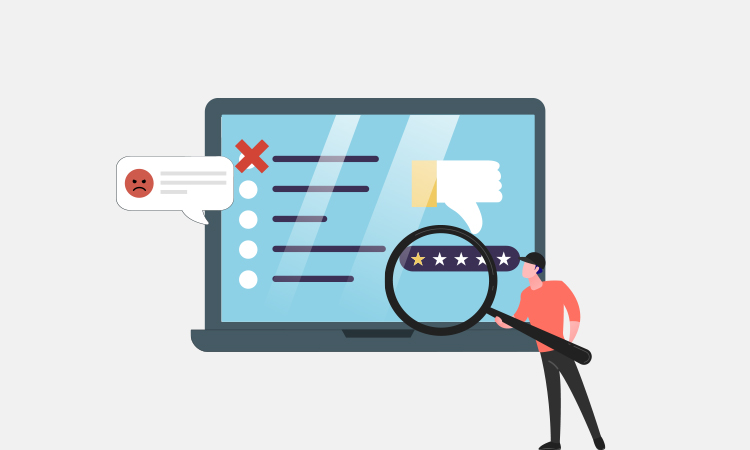
In today’s ever-evolving digital scenario, the world of politics has shifted to the online medium. Whenever any political controversy happens, you can notice that most of them take place on the internet.
For example, your opponent has posted something negative online related to the speech you recently gave during an inauguration. You want to respond to those negative claims – where? The answer is through the internet. Thus, most of the political debates and conversations happen online.
This can lead to an ugly argument on an open forum, followed by widely circulating negative reviews or fake stories about your political party or fake stories. The online world will watch the entire thing and form different opinions regarding the issue.
Your opponents, as well as those who perceive negative opinions about you, can leave negative reviews online. According to a study by Inc., one single negative review requires nearly 40 positive reviews to mitigate the damage. You can also write a thoughtful response as an attempt to neutralize the negative review.
A politician must track whether there is any fake story circulating online or any negative reviews they’ve received recently. Regular tracking can help you detect those reviews beforehand and appropriately respond to them to prevent reputation damage.
- Suppress Negative Reviews and Search Engine Results
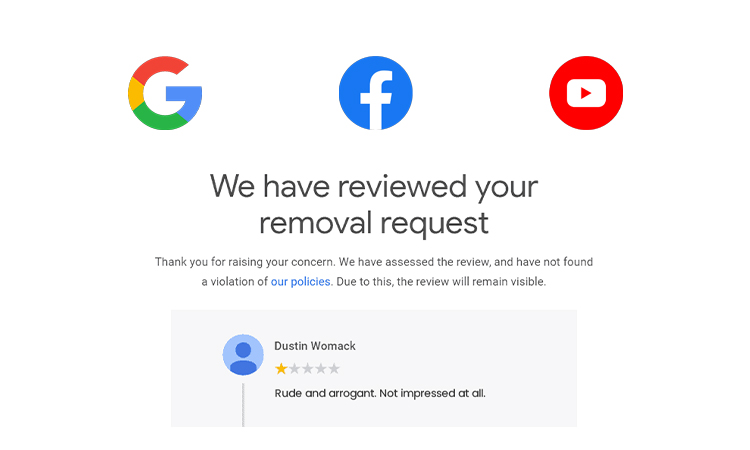
As a politician, you cannot be astonished seeing your opponents sharing defaming content against you. It’s quite common! But the surprising thing is that search engines’ autocomplete options tend to showcase negative suggestions, keywords, and links with your name search.
Nothing to worry about, as there is a specific method to suppress this negative review circulation and search engine results. This method will help you suppress negative reviews and protect yourself from defamatory news. Let’s have a quick look.
- Negative content removal – A politician must implement negative content removal strategies before the negative content can hurt their online reputation. This is one of the most impactful procedures regarding online reputation management for politicians.
- Request the removal – They can directly request the review site team to remove the reviews.
- Legal review removal request – if you think that the review has violated copyright, trademark, or other laws, you can submit a legal review removal request through Google Legal Help Center.
- Create positive content – We suggest you develop high-quality content like blog posts, articles, and social media updates to suppress the negative reviews and search results
- Website optimization – If you’ve an official website, you must optimize it with SEO-friendly keywords to improve your search rankings.
- Acquisition of positive backlinks – You can publish guest posts and articles to attract meaningful and positive backlinking opportunities from authoritative political websites.
- Engagement with online political communities – Politicians can actively participate in online forums and social media discussions to engage more with online communities.
- More positive review generation – Ask your loyal followers to leave their reviews about your political party and how they have benefited from the work you’ve done for their well-being.
- Handle Crisis Situations with a Strategic Approach
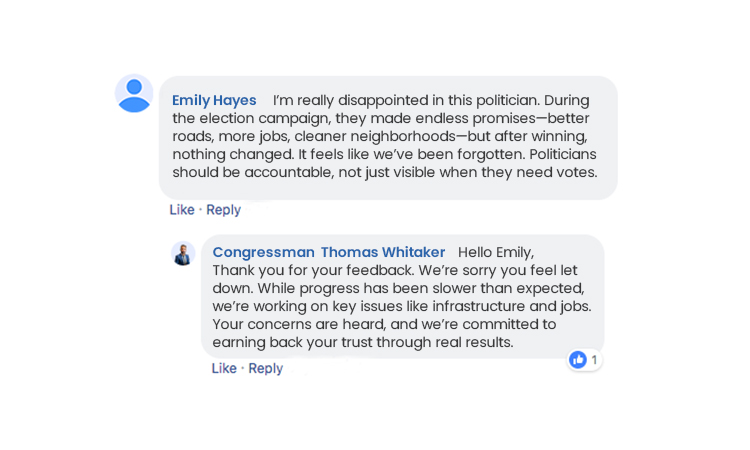
You need a proactive approach to manage political crises in today’s digital age. Every online platform has its own unique characteristics, and you need to personalize your approach according to them.
- Firstly, you need to identify the crisis through online monitoring and media coverage.
- Secondly, you must timely and tactfully respond to the negative news, reviews, and media coverage by maintaining transparency.
- Lastly, it’s time to focus on the post-crisis online reputation repair through positive content generation and circulation across the web.
How to Overcome Crisis Situations for Politicians with a Proper Plan?
Here’s a detailed overview of how you can seamlessly perform the above-mentioned practices.
- To identify a reputation crisis, a politician can look for sudden increases in online negative reviews, comments, and messages. They can look for any sudden shift in negative sentiment or negative press from influential sources.
- To promptly respond to a crisis, you need to tactfully deal with the narrative and stop misinformation from spreading. Reflect your honesty and accountability as a trusted political figure in your response. It’s always best to acknowledge your mistake and avoid hateful arguments if you have truly made one.
- To repair their online reputation post-crisis, political figures can rebuild trust with their constituents through concrete actions and active engagement. They can generate positive content and promote their success stories to suppress the negative press.
However, it’s important to learn from such a crisis and identify what went wrong. It will help you avoid future crises and take necessary precautions to handle them better.
- Utilize Tools to Manage the Online Reputation of Politicians
If you’re thinking that the process of political online reputation management is quite complex, you can use certain tools to make the process seamless. Here we have discussed the top 5 important tools that politicians can use to monitor their political reputation. You can explore their utilization and choose the most suitable one for your political party based on its requirements.
Top 5 Major Tools to Monitor Political Reputation
You can explore the utilization of these five tools here and choose the most suitable one for your political party based on its requirements.
- Sprinklr Social
This is a social listening tool that helps to track brand mentions across different social media channels and the web. A politician can track what people say about their party or the work they do.
The following are some major features of this tool.
- Sentiment Analysis – Helps you in analyzing public sentiment regarding your online mentions and provides you with insights into how you are being perceived as a political leader.
- More Engagement – Allows you to respond to public feedback, engage in meaningful conversations, and address concerns directly through social media.
- Competitive Benchmarking – Helps you compare your political party’s online reputation against your opponents and identify areas for improvement.
- Reporting and Analytics – Offers comprehensive reports and analytics related to your online reputation and helps you track your progress.
- Brandwatch
This is one of the most helpful tools to ensure the success of online reputation management for politicians. gathers data from a vast range of online sources such as social media platforms, news sites, blogs, and forums. It gives you a broad overview of the online presence of your political party.
Here are some significant features of Brandwatch.
- Advanced Analytics – Allows you to use advanced analytics features to understand how you are being visually represented online as a political figure.
- Personalized Dashboards – Allows you to create customized dashboards to track certain metrics and personalize the information based on your requirements.
- Alerts and Notifications – Sends you alerts when certain keywords or phrases related to your political approach are mentioned and allows you to swiftly respond to emerging issues.
- Google Alerts
This is a free tool from Google that you can use to get email notifications when you’re or your political party’s name is mentioned across the web. You can set this alert for your political party’s name and relevant keywords related to it.
Let’s check out the features of Google Alerts and how you can utilize them.
- Simple Setup – Offers you easy-to-set-up and customizable alerts based on the user’s preferences.
- Limited Functionality – Offers you basic functionality and no advanced features like sentiment analysis and competitive benchmarking, as compared to other tools.
- Email Notifications – Ensures that you receive notifications through emails about relevant content and mentions related to your political party.
- CisionOne
It is a comprehensive AI-powered platform that offers you an extensive range of features for public relations and communication professionals. You can monitor media coverage, journalist outreach, social listening, and analytics.
Check out the following features of CisionOne.
- Real-time monitoring – Tracks print, radio, TV, social media, and podcast coverage in real-time.
- Global Reach – Monitors media in more than 190 countries and 96 languages.
- Customizable Alerts – Helps you set up alerts for specific keywords, online mentions, and relevant topics through email, Slack, Teams, and mobile push notifications.
- Advanced Filtering – Allows you to filter the alerts by media type, source, content, and date range.
- Podium
This tool prioritizes online reviews across various digital platforms like Google, Yelp, and Facebook. A politician can understand the feedback of their supporters with the right utilization of this tool.
Explore the major features of this specific tool.
- Review Generation – Helps you proactively request reviews from your loyal supporters and boost your positive online presence as a political figure.
- Reputation Monitoring – Provides tools to monitor the online reviews you’ve received, identify potential crises, and respond on time to those negative reviews and news stories.
- Centralized Dashboard – Offers a centralized dashboard where you can manage all your online reviews.
- Perform SEO Best Practices for Your Official Website
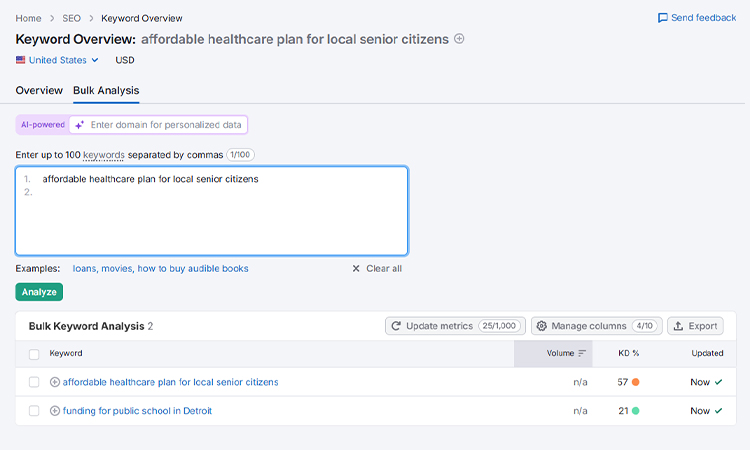
What will your constituents search for when they get to know about your political party? Your official website is the first point of contact for your constituents. It must be capable of attractively presenting an overview of your political values and approach.
And it must be SEO-optimized with an enhanced online visibility and digital presence. You must ensure that the right information about your political approach is presented to the stakeholders through the website. Search engine optimization plays a huge role in online reputation management for politicians.
According to a study, around 63% of consumers trust online search engines the most when they look for a new business. Even your constituents may consider you a credible political source if they find your website on the first page of their search results.
How can you make your website rank on the first page of search engine results? You need to perform the best SEO practices. Let’s find out how you can optimize your political website.
Conduct Detailed Keyword Research
You must find a list of broad topics related to your political practice and the current political climate. You can also look for issues important to your potential voters, such as healthcare, education, the economy, and immigration.
Developing a list of long-tail seed keywords from those broad topics is your next step. For example, you can choose keywords like ‘affordable healthcare plan for local senior citizens’, ‘job creation plan in (city name)’, ‘sustainability initiatives in (district name)’, and ‘funding for public school in (region name)’.
Tools like Google Keyword Planner, Ahrefs, and Semrush can help you expand a list of keywords related to your political practices. With the help of these tools, you can get insights about the keywords’ search volume and ranking difficulty. We suggest you choose long-tail keywords with lower difficulty and higher search volume.
Optimize the On-page Elements
Perform the following practices to optimize your website content with these keywords. You must incorporate your primary keywords in –
- Page title and the first 100 words of your content
- Headings and subheadings
- Meta title and meta descriptions
- Image Alt Texts
- Site URLs
- Body Content
You must ensure that your website content demonstrates experience (E), expertise (E), authoritativeness (A), and trustworthiness (T) – the EEAT, a framework by Google to check the content quality of website content.
Perform Off-page Optimization
Politicians must perform these off-page optimization best practices to showcase themselves as a reputable political resource.
- Backlink Acquisition – Acquire qualified backlinking opportunities from authoritative and reputable political websites.
- Guest Posting – You must write guest articles or blogs to post them on other reputable political websites to link them back to your official site.
- Social Media Marketing – Politicians must prioritize their social media presence as well by posting engaging content to attract more followers.
Optimize Your Website for Local SEO
A politician’s success largely depends on the number of local voters he/she has achieved so far. Through effective local SEO practices, political figures can attract more local people and build a strong reputation in a specific location.
- GBP Claiming – Create or claim your Google Business Profile and incorporate the name, address, and phone number (NAP details) of your office.
- Local Keyword Optimization – Politicians need to optimize their websites with local keywords to make them rank for relevant local search results.
- Schema Markup – They must implement schema markup on their website to provide the search engines with structured data related to their political practice and office location.
Prioritize Technical SEO Optimization
Apart from these practices, politicians must ensure that their website seamlessly functions across all devices. A poorly functioning website can hamper your efforts in online reputation management for politicians. How can they ensure it? Let’s find out.
- Politicians must create a mobile-responsive design for their website. With the increasing usage of mobile applications, most people prefer to access a website through their mobile devices. Did you know that people who use mobile devices contribute to 64.14% of all website traffic.
- They must ensure that their website pages load faster and function seamlessly across various screen sizes. It’s extremely crucial to drive organic website traffic to your political site.
- Additionally, they must keep track of whether search engine crawlers can easily access and understand their site’s content.
- Effectively Perform the Legalities
When you want to effectively manage your online reputation as a politician, you must have a clear idea of the legal aspects involved. Let’s understand how you can perform the legalities for your political reputation.
- Defamation, Libel, and Slander – You can take legal action against the false statements made by any person to harm your reputation.
- Right to Privacy vs Public Interest – Unfortunately, politicians cannot expect privacy to any greater extent. However, they can protect their personal information online and make necessary adjustments to online privacy settings.
- Copyright Law and Online Content – When you use others’ content online, you must obey the copyright law. You need to seek permission or give credit to use the content. Otherwise, you can only use content available under the public domain or Creative Commons licenses.
- Laws Related to False Light and Intrusion Upon Seclusion – You can also take legal action if someone tries to present you in a false light and spread misleading information about you.
You may struggle to navigate the legal aspects of online reputation management as laws vary depending on jurisdiction. Politicians can consult with a legal expert if they consider legal proceedings related to their digital image.
- Conduct Regular Reputation Audits
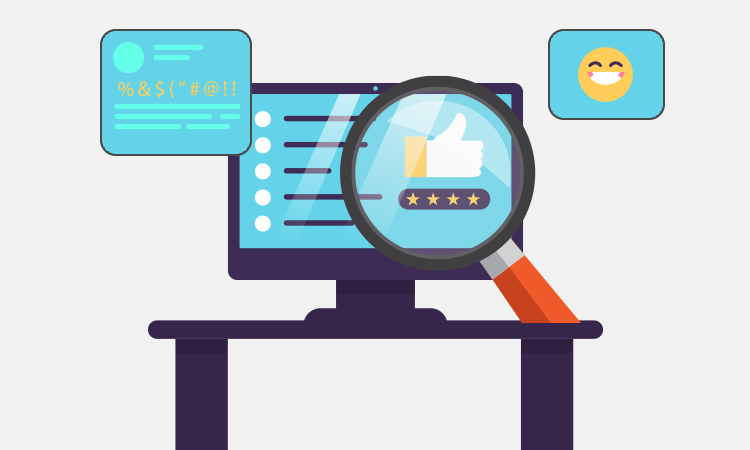
Regular audits can help you monitor your online and social media activity and news coverage to identify potential risks beforehand. Audits can help you identify the areas for improvement regarding your online reputation as well.
Explore how you can do the audit seamlessly.
- You need to open Google in an incognito browser window and search for your or your political party’s name.
- You can review your GBP profile, its ratings, reviews, comments, and more.
- You must take notes of what results appear on the first page of your search results.
- Create a list of the sites you can control and those third-party ones that you can’t control.
- You need to track the online mentions of your name or your political party’s name, policy initiatives, and related keywords.
- You need to track your mentions in social media platforms like Facebook and Twitter, online community platforms like Reddit and Quora, and review sites like Yelp and Google.
- Analyzing public sentiment about you is crucial to understanding the tone of online discussions and news coverage about you.
This will help you identify potential vulnerabilities and areas for improvement. You can tailor your online reputation management strategies to address those risks and opportunities.
- Prioritize Digital PR and Media Coverage to Improve Your Online Reputation
Digital PR, a beneficial strategy of online reputation management for politicians, significantly shapes and enhances a politician’s online reputation. As a political figure, you must craft consistent and positive narratives online about yourself.
You can hire PR professionals to manage public perceptions, ensure your party’s value and achievements. They can help you create a well-strategized PR campaign addressing the potential crises and transparently communicate with your constituents.
As a part of your online reputation management strategy, politicians must develop relationships with influential media channels and thought leaders to cover their stories, increase their reach, and credibility. Through effective PR, a politician can quickly identify and respond to negative sentiment and transform challenges into growth opportunities.
Want to know another outstanding aspect about digital PR? It’s a collaboration with popular social media influencers.
They can even collaborate with social media influencers who have a noteworthy number of online followers. Partnering with them can help political figures reach a wider target audience and build public trust. Furthermore, they can get valuable insights into their target market preferences and behavior.
Types of Online Assets Politicians Can Use to Build and Manage Their Reputation
There are many types of online assets that politicians can use to build and manage their public image. With the continuous digital advancements, it has become easier for them to reach a wide audience and build a strong online image.
The following are some crucial online assets that you can utilize to build a robust reputation as a political figure. Let’s have a look.
- Social Media Platforms – You can share engaging content like the latest updates about your political party, behind-the-scenes insights, and interactive polls. Additionally, you can interact with your followers through comments and direct messaging facilities to increase your social media engagement. It also allows you to showcase your political personality and achievements through visual elements.
- Personal Website – A politician can showcase their vision, values, and policies through a website. It’s the best platform to share updates about their work and achievements. People can get a brief review of your political approach and engage with you more through contact forms and newsletters. Furthermore, a website allows you to provide political resources and other valuable information through blogs and an FAQ section.
- Email Newsletter List – This is the best way to provide insights into your policy decisions and initiatives. Online reputation management for politicians requires you to send email newsletters to offer exclusive content. Such email newsletters can encourage more constituent engagement through surveys and petitions.
- Podcast or Video Series – Nowadays, politicians can use podcasts and videos to connect with voters on a more personal note. Through this, they can reach a specific demographic, like younger audiences who are new voters. They can storytell their insights and shape public perception by providing a sense of transparency and authenticity.
- Online Advertising Channels – Politicians can advertise their events, assemblies, and other crucial information through these channels. They can run issue-based advertisements and utilize high-quality images or videos to attract more supporters. Additionally, they can address misinformation and promote accurate details through the ads.
- Wikipedia Page – Politicians can use their Wikipedia page to improve their public image and online reputation. They can ensure that the information about them presented online is accurate, well-sourced, and verified. Through this, they can actively manage their online presence and address inaccuracies, if any.
- Digital Fundraising Platforms – Politicians can use these platforms to build a public image of accessibility and transparency. They can directly engage with their constituents and have personalized conversations with them. Targeted fundraising appeals through these digital platforms ensure success and showcase the impact of donations as well.
- Online News and Blogs – You can share your expert opinions and data insights on key political issues through blog posts on your website. On the other hand, online news allows you to engage with political journalists and build meaningful connections. You can use media coverage to promote your campaigns and attract more supporters.
- Public Forums and Discussion Boards – These platforms allow political figures to engage in respectful and informed discussions with the public and other prominent political personalities. They can get informed about crucial public concerns and respond thoughtfully. Communicating with the public personally can demonstrate how much a politician values their constituents’ opinions.
Why Must Politicians Build and Protect Their Online Reputation?
In today’s digital landscape, people prefer to search online when they want to know about a political figure. If your online appearance conveys a negative image as a political person, you may have to face various crucial consequences. From credibility to elections, a politician can lose both if he/she has a negative online reputation.
As the digital landscape continues to evolve over time, politicians must implement online reputation strategies to stand out in the competition. Challenges like social media trolls or misleading information can ruin their online image. Explore the reasons why a politician must build and protect their online reputation.
- Great Impact on Election Result
Misleading political information circulating online can significantly influence election outcomes. It is often seen that political parties share misinformation online about their opponents just before the elections. This specifically happens to influence the election results. If you effectively monitor and manage your reputation online, it can positively impact the election result and turn it in your favor.
- Exceptional Political Growth
A positive online image of a politician can lead to exceptional growth in their career. As more people will trust their capabilities to lead a community, it will significantly impact the election outcome.
To foster political growth, a political figure needs to actively manage their online reputation as well as their digital presence. Effective online reputation management for politicians can help you maintain credibility and increase engagement with voters, which often leads to positive public perception about a political figure.
- Promotion of Desired Image
As a political person, you must have a desired online image of yourself. You need to follow political reputation management strategies to promote your desired public image online. You can control how people perceive you as a political leader.
Additionally, you can promote positive information about yourself to give numerous reasons for the public to trust your capabilities to lead. All these practices can help you build the desired image of yourself across online platforms.
- Protection from Online Trolling and Negative Messaging
A political personality can prevent negative information from circulating further and even mitigate the effects of the same through impactful ORM strategies. They can identify such information beforehand before they circulate more.
They can protect their reputation from negative messaging and perform ORM practices to push those messages further down the stream naturally. With effective ORM, politicians can tactfully respond to online or social media trolls and safeguard their public image.
- Increasing Number of Supporters
Political persons must follow ORM strategies to grow their supporter base. Effective ORM techniques require promoting positive information and building a desired public image online. This can influence people’s perception and electoral prospects. It will build public trust by preventing the circulation of negative information and loss of supporters.
- Build Public Trust
Political figures can build public trust with the right utilization of online reputation management strategies. The process requires you to share positive information regarding your political capabilities, which can directly impact people’s trust in you. It allows you to build a strong online reputation based on transparency and authenticity, which is enough to win over the public trust and foster confidence among them about your political presence.
FAQs
Yes, you can. Though this is not mandatory for politicians to collaborate with influencers to promote their party, they can consider this as a part of their public relations activities during elections. Today’s social media influencers have a worldwide audience reach. A politician can use the audience’s reach and promote their party’s message.
You can face crises like negative information or fake news circulating online before elections. You may notice your deepfake video going viral and running your public image. Your opponent can republish old videos of your controversial remarks that can hurt public sentiment. They can also send negative messages to you through social media platforms or share unverified claims related to your political party online.
Politicians often participate in heated arguments with their opponents online. As those are open platforms, even the supporters can see how the politician they are supporting responds to different public sentiments.
Additionally, political figures often don’t prioritize fraud prevention and cybersecurity threats. They fail to create an impactful plan for their crises as well. It has also been seen that politicians post fake reviews that later lead to reduced trust in their supporters. Focusing on one digital platform is another common mistake many politicians make.
Yes, it is important to complete the legal formalities to improve your political reputation. It is not only a significant factor, but they must adhere to legal requirements and ethical guidelines to showcase transparency and accountability. These two are the key components of a positive online presence for politicians. They need to comply with political campaign finance laws and advertising regulations.
Conclusion
Many politicians may not prioritize their online reputation even in today’s competitive digital era. Every political figure must have a strong and positive online reputation to stand out from their opponents and attract more supporters. It not only helps a politician build public trust but also positively impacts their electoral outcomes.
Just like every other online marketing technique, online reputation management for politicians also requires you to follow a strategic approach. Our step-by-step guide to building and protecting a politician’s online reputation will help you understand the process better.
It will also help you seamlessly achieve your desired public image and thrive online with a positive political reputation. However, seeking professional reputation monitoring services can be an outstanding idea to get personalized guidance from a skilled and expert team.

